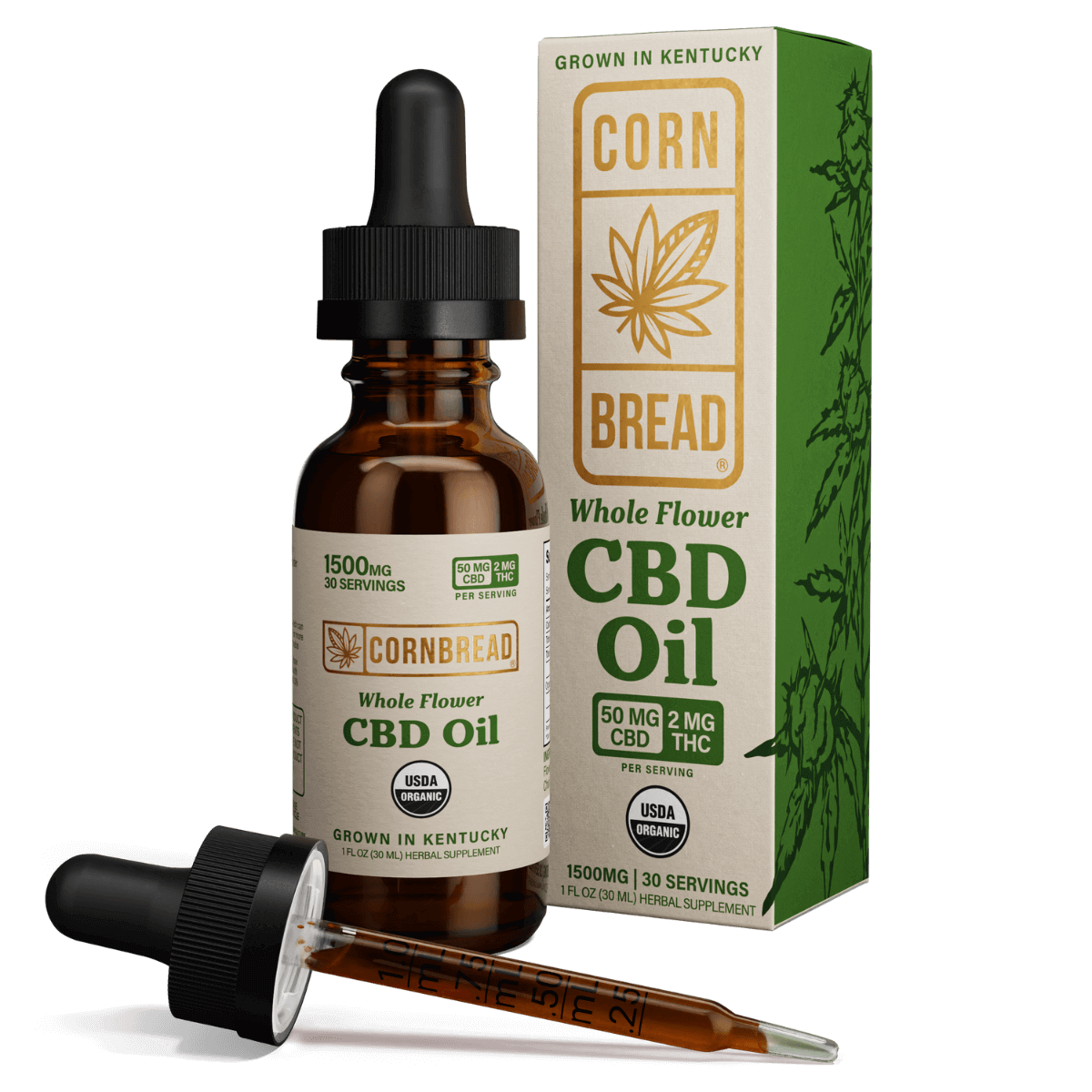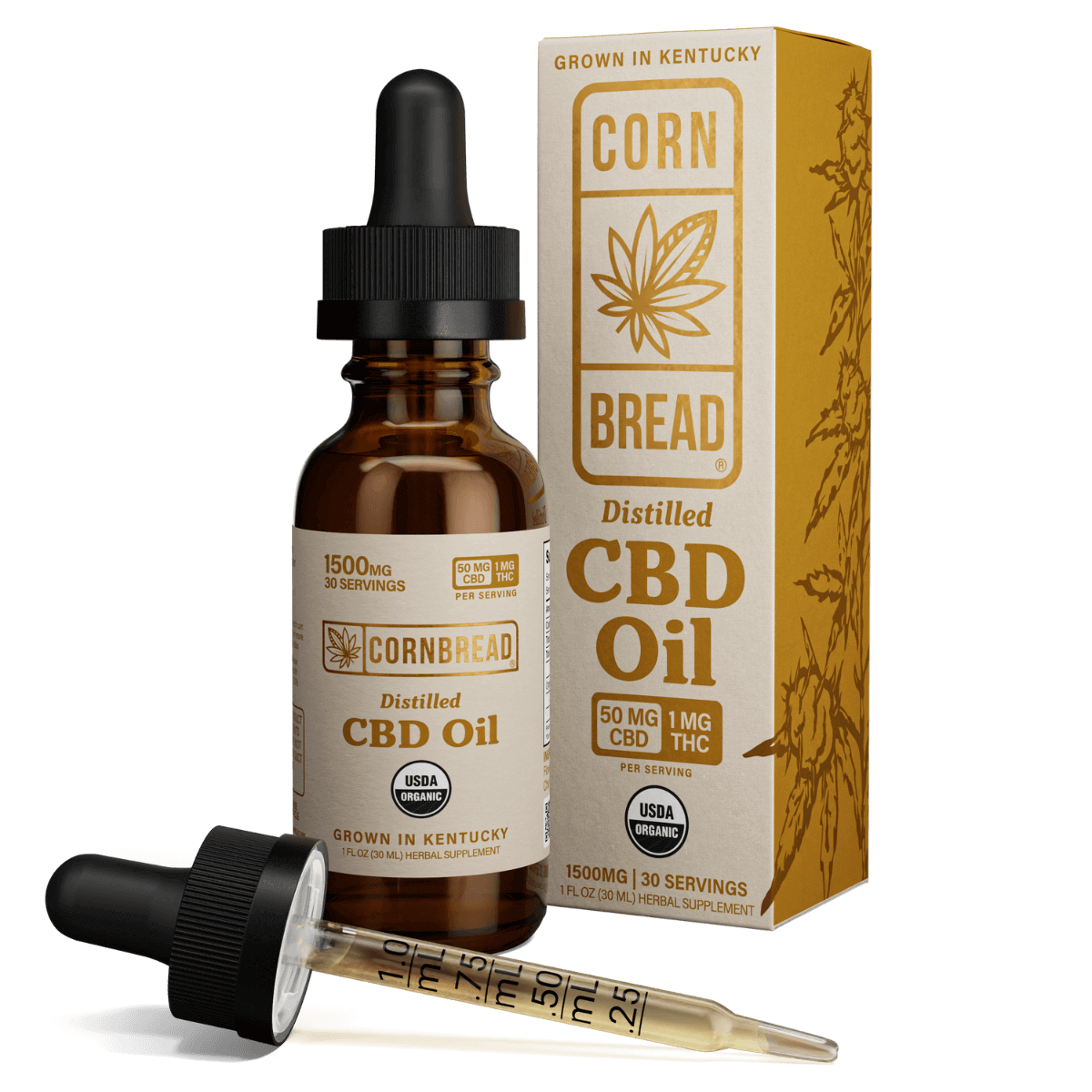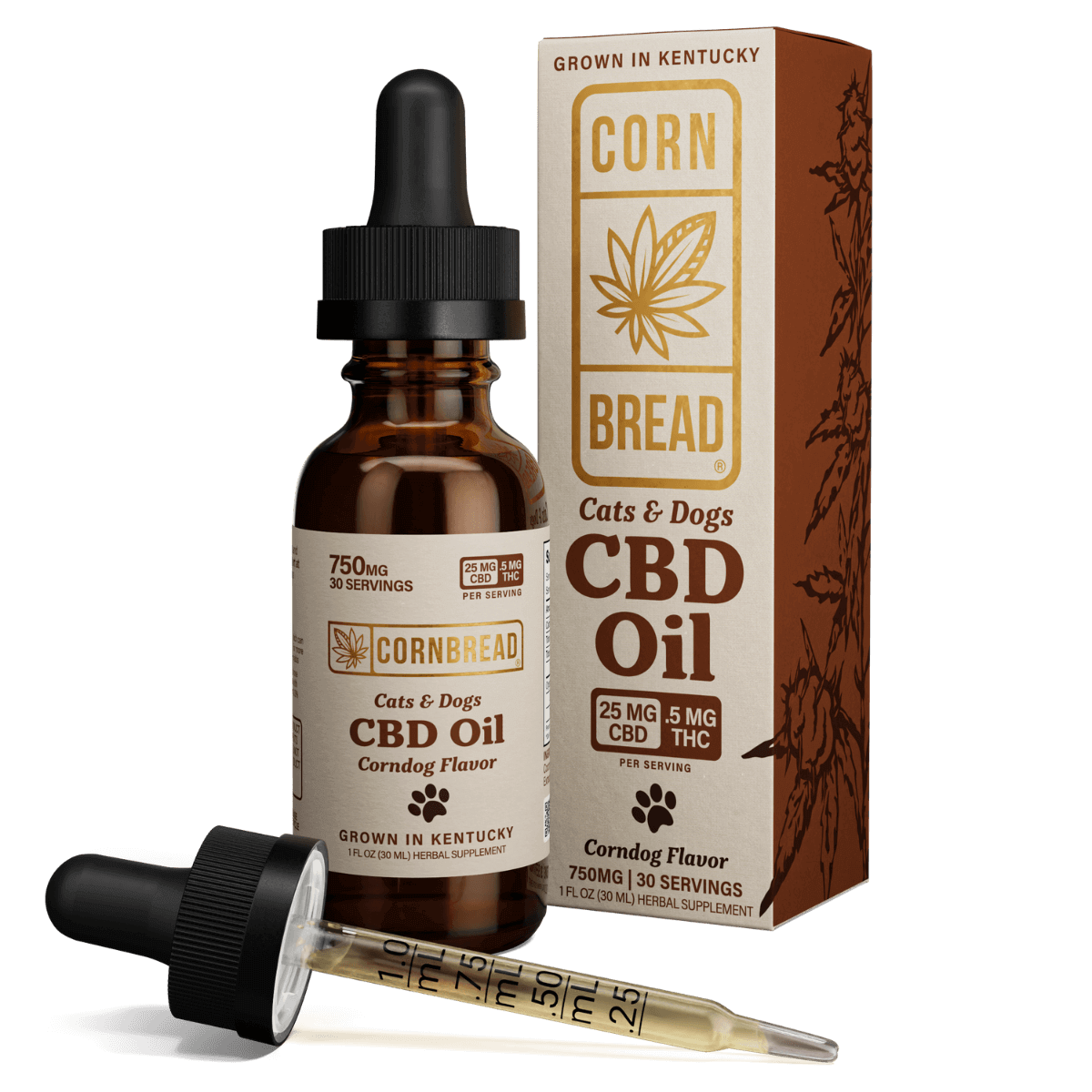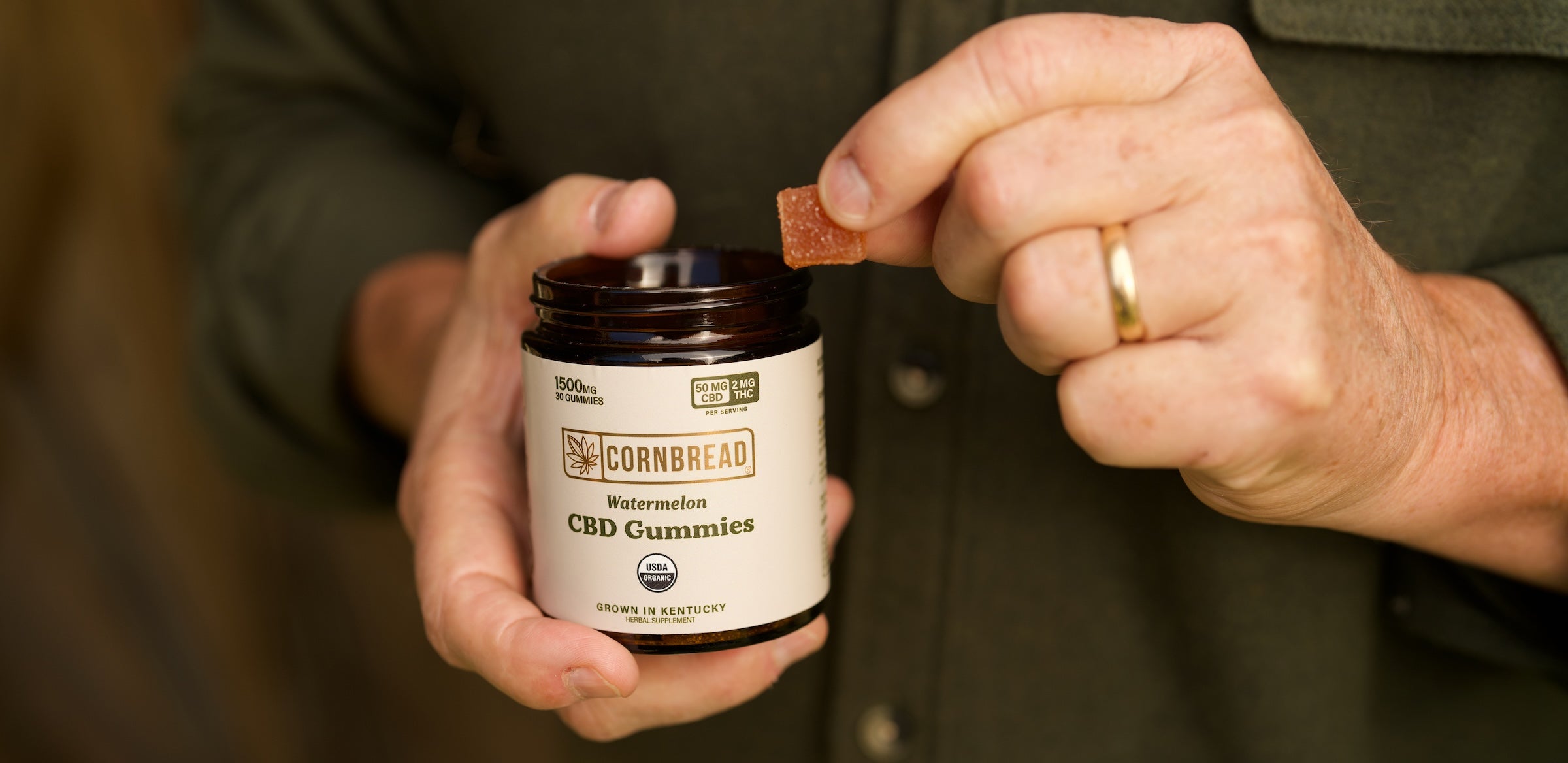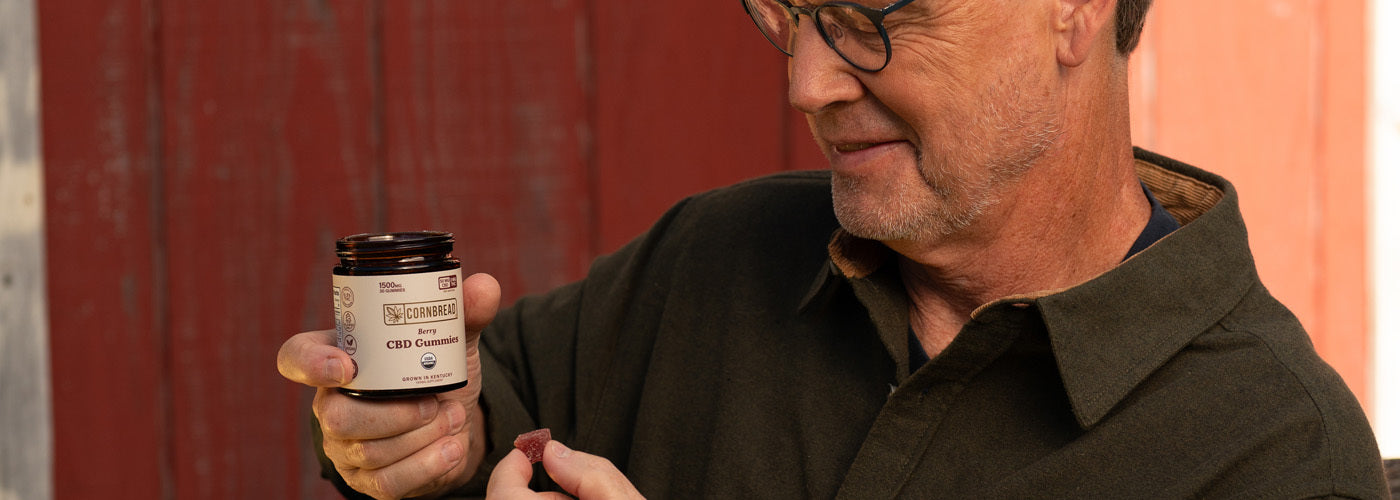Table of Contents
- Introduction
- Can You Overdose on CBD?
- High-Quality CBD vs. Low-Quality CBD
- How To Find High-Quality CBD
- Safety and Side Effects of CBD
- Can CBD Oil Be Addictive?
- Can You Build a Tolerance to CBD?
- Can Pets Have a CBD Overdose?
- Finding the Proper Dosage of CBD
- CBD Dosage: How Much CBD Should You Take?
- The Cornbread Hemp Difference
Introduction
These days, cannabidiol (CBD) supplements are available virtually everywhere. This is largely due to a key piece of legislation — the “2018 Farm Bill” — which made it federally legal to cultivate hemp plants (a variety of cannabis) as long as it contained no more than 0.3% tetrahydrocannabinol (THC). With hemp's new legal status, hemp-derived CBD products also became federally legal.
The low THC content in hemp sets it apart from marijuana — another variety of the cannabis plant. Where marijuana has THC as its primary cannabis compound (or cannabinoid), hemp’s primary cannabinoid is CBD. CBD doesn’t cause the high feeling associated with THC. Instead, it’s been found to improve sleep, reduce everyday stress, and relieve aches and pains associated with exercise-induced inflammation.
But can you overdose on CBD? Is it addictive? Does CBD have side effects? In this article, we’ll explore those questions and discuss how to determine an effective CBD dose for optimum potential benefits.
Can You Overdose on CBD?
If you're wondering, "Can you overdose on CBD gummies or oil?” you're not the only one. This is a common question.
The term “overdose” has a few different meanings. Certain types of drug overdoses can result in death — like those involving heroin, cocaine, sleeping pills, or prescription opioids. However, "overdose" can also mean taking more of a substance than was intended or recommended, no matter what the substance is.
According to the World Health Organization1 (WHO), CBD “in its pure state does not appear to have abuse potential or cause harm.” Clinical trials have evaluated reactions to different doses and different forms of CBD (oils and gummies were among them). These studies accounted for several variables: weight, diet, sex, and age. The result? No overdoses occurred. Of course, you can accidentally take more than the recommended dose, but the side effects are minimal. (We’ll cover the potential side effects a little later in this article.)
More research into CBD and its properties is required, but current evidence points to overdoses from CBD being highly unlikely.
High-Quality CBD vs. Low-Quality CBD
Not all CBD supplements are created equal. Most CBD supplements contain much more than just cannabidiol. With limited government regulation of the hemp industry, low-quality or mislabeled CBD supplements have flooded the market, making it difficult for consumers to trust CBD companies.
For example, the Federal Drug Administration (FDA) conducted a study in 2020 where over 100 CBD products were tested to determine if the labeled CBD content matched the actual CBD content.3 The results were alarming: 18 products contained less than 80% of the labeled amount of CBD, 46 contained within 20% of the amount listed, and 38 contained greater than 120%.
In addition to misleading labeling, some CBD supplements contain pesticides, heavy metals, and other toxins. All of which could cause a CBD supplement to do more harm than good, especially when taken in higher dosages.
How To Find High-Quality CBD

Among the many CBD companies and manufacturers out there, you can still find some that take the necessary steps to ensure their products are made from high-quality CBD, are properly labeled, and are devoid of any harmful additives or contaminants. So, what should you look for?
Third-party Testing and Certificates of Analysis
Companies and manufacturers use third-party testing to confirm the cannabinoid content of their products. This information is then made available to the public in the form of a certificate of analysis (COA). Any company that doesn’t provide COAs to consumers should be avoided.
CBD Derived From Organic Hemp
The hemp plant is what’s called a “bio-accumulator,” which means it absorbs contaminants from the soil faster than it can expel them.4 These contaminants include pesticides, heavy metals, and other toxins. CBD extracted from contaminated hemp will contain these contaminants (bad news for consumers). You can avoid these contaminants by only consuming CBD made from organic hemp.
Sugarcane Ethanol Extraction Process
There are several ways to extract CBD and other cannabinoids from hemp, and some are better than others. Small batch extractions using sugarcane ethanol result in an extremely clean and safe CBD extract. This method is more gentle than other methods, resulting in better-tasting CBD supplements without any bitterness. If the sugarcane ethanol is organic, that’s even better.
Safety and Side Effects of CBD
CBD is typically well-tolerated, and for most, no negative side effects will result from taking CBD. In 2019, a group of physicians looked at over 35 studies of CBD products being used in a medical context. The dose of CBD for the studies ranged from less than 1 mg/kg of body mass to more than 50 mg/kg of body mass. Despite the large doses of CBD in the studies, the doctors saw no serious adverse effects from CBD. Those subjects who took the larger doses didn’t become sick in any way, but they did show some signs of sedation or calm.
Keep in mind that, for some, CBD can potentially cause uncomfortable side effects,5 such as:
-
Drowsiness
-
Decreased appetite
-
Mood changes
-
Gastrointestinal discomfort (diarrhea, for example)
These are neither common nor serious, but if you do experience adverse effects from a CBD supplement, such as a change in your heart rate, lowered blood pressure, or blood circulation, or if you develop headaches, be sure to consult your doctor.
It’s important to understand that full-spectrum CBD extract is neither a drug nor candy. CBD is considered by many health care practitioners to be a dietary supplement, much like fish oil, and should be used in moderation, according to recommended guidelines.
Can CBD Oil Be Addictive?
CBD is not habit-forming, decreasing the risk of it being taken in excess. Even those with a history of substance abuse are not likely to become dependent on CBD because it doesn’t produce the euphoric “high” associated with THC-rich marijuana and other hard substances.
Can You Build a Tolerance to CBD?
Some people claim that CBD has less of an effect on them than it did previously or that it takes longer to work, which could be an indication of CBD tolerance. An easy way to address this issue is to begin taking your CBD at a different time of day, taking a short break from your CBD regimen, or consuming CBD less regularly and only to address specific situations (such as sore muscles after exercise).
If you’re a regular user of marijuana products, you might experience CBD differently. As CBD is also present in marijuana, there’s a possibility you could build a CBD tolerance through its regular use.
Switching to another form of CBD could also help address CBD tolerance. If you’ve been taking CBD supplements that are either isolate (pure CBD) or broad-spectrum (containing various cannabinoids but only trace amounts of THC), then you may find an improved experience by switching to full-spectrum CBD made from Flower-Only™ hemp extract.
Full-spectrum supplements contain CBD as well as all of the other cannabis compounds in hemp (including no more than 0.3% THC). When CBD is consumed along with these other cannabinoids, its potential benefits are greatly increased, as opposed to when CBD is taken on its own.
Can Pets Have a CBD Overdose?

Research indicates that our pets respond to CBD in much the same way we do. Like humans, animals have an endocannabinoid system (ECS) that interacts with endocannabinoids (those created within the body) and exocannabinoids like CBD, which have to be introduced to the body through oral or topical means. This ECS affects nearly all systems within the body, which is why cannabinoids like CBD seem to have such a wide range of benefits. Still, you don’t want to overdo it.
If a pet consumes too much CBD oil, the most likely adverse effects will be lethargy, vomiting, and/or incontinence. While these aren’t life-threatening side effects, they’re certainly not pleasant. To avoid any uncomfortable reactions, be sure to follow the CBD dosage guidelines for the product you’re giving to your pet.
You can start by reading our CBD Guide for Dogs, as well as our CBD Guide for Cats. Holistic veterinarians are also very knowledgeable when it comes to how to include CBD in your pet’s wellness regimen.
When included in your pet’s regular routine, CBD may provide relief from aches and pains, daily stress, and a poor sleep cycle — all of which can be common among older pets. Many pet owners have found CBD to be a low-risk option with the potential to increase their pets’ quality of life.
CBD dosage is based on the body weight of your pet. So it would not be recommended to give a Great Dane and a small house cat the same dose of CBD. The Great Dane won't experience the desired effects with a cat-sized dose, and the cat that’s been given too much CBD would likely become sleepy and lethargic.
Finally, it’s best to give your pets CBD supplements that are designed for them, as opposed to those intended for human consumption. The strength and flavors of CBD oils and edibles for animals are formulated to appeal to your pet.
Finding the Proper Dosage of CBD

The goal is to optimize the potential benefits of your CBD supplement while avoiding any adverse reactions (as rare as they may be). So, how do we take enough CBD without taking too much CBD? The answer depends on a few factors. The strength of your CBD, how you’re taking it, your tolerance, and your body weight, are the main things we need to consider.
CBD gummies and CBD capsules are taken orally and must pass through portions of your digestive system before taking effect. The positive effects of CBD taken this way tend to last longer than other methods, and there are some preparations of CBD that work best this way, especially when taken with (or following) a high-fat meal.
Another thing to consider is your own personal history with CBD, and cannabis in general. If you don't have any experience whatsoever, start slow with the lowest recommended dose.
First-time users of CBD should start with a lower dose — we recommend 25 mg per serving. Maintain this dose for the first two weeks before increasing it gradually. It can take up to two weeks (and possibly longer) for you to begin to feel the effects of CBD, so be sure to go “low and slow” when starting out.
If you’re more experienced with CBD and cannabis you may already know how CBD makes you feel and might be tempted to start with a higher dose. Remember, there’s a wide range of quality and dosage strength across the many CBD supplements on the market, so a new product may have a stronger effect than you’re used to.
Full-spectrum CBD oil, for instance, tends to create greater effects than CBD isolate or broad-spectrum oils. For this reason, even experienced CBD users should start with a lower dose when taking a new CBD supplement. Remember, you can always increase your daily dose after a few days if you feel that you need more.
CBD Dosage: How Much CBD Should You Take?
Follow the Instructions on the Label
The best practice is to always follow the instructions on the label of the CBD product. To learn more about specific dosing, check out our CBD dosage guide.
Don’t Overdo It
CBD has no intoxicating effects, so there is no reason to take more than indicated.9
Be Consistent
CBD works best when taken consistently. If you need help keeping track, try out this free CBD Relief Journal.
Consult Your Doctor or Pharmacist
If you’re concerned about the drug interactions between CBD and other medications you're taking, make sure to contact your pharmacist for an evaluation of drug interactions. And if you’re taking a CBD supplement on the advice of a healthcare provider, be sure to follow their specific instructions.
The Cornbread Hemp Difference
Cornbread Hemp uses only the highest quality, pesticide-free, organic Flower-OnlyTM hemp extract. We employ third-party lab tests to ensure that our customers receive the safest and most effective CBD supplements available on the market or your money back. We know how important it is for you to do your own research when choosing a wellness supplement, which is why we provide honest customer reviews on the Cornbread Hemp website.
We recommend that most CBD first-timers start with a daily dose of 25 mg of CBD. Our products are designed to easily measure 25 mg per serving, with a graduated glass dropper that has four equal parts with coinciding lines.
Browse our selection of USDA organic CBD oils, CBD capsules, CBD topicals, and pet oil!


